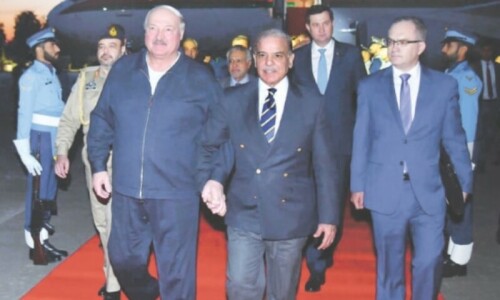BAGHDAD, July 23: Iraqi President Jalal Talabani on Wednesday rejected a provincial election bill a day after it was adopted in parliament, making it all but certain that polls due in October would be delayed.
“The president does not accept a law like this, a law that 127 deputies voted on and which does not represent even half of the parliament,” a statement from Talabani’s office said.
A delay would be a blow to Washington and the outgoing administration of President George W. Bush, which sees the elections scheduled for October 1 as a key step towards national reconciliation among Iraq’s divided communities.
“The Iraqis have said that they’d like to try to do it by the end of the year,” White House spokeswoman Dana Perino said.
“We think that that’s important. We think that local elections would help in Iraq to further reconcile all the groups.”
Iraq’s 275-member parliament adopted the law in a vote on Tuesday in which only 127 MPs backed the bill and 54 Kurdish parliamentarians and some Shia ministers walked out in protest.
“The president has the confidence that the Presidency Council will also not pass this law,” Talabani’s office said.
The three-member Presidency Council, which includes Talabani, a Kurd, Shia Vice-President Adel Abdel Mahdi and Sunni Vice-President Tareq al-Hashemi, has the power to veto legislation and is expected to reject the elections law.
It ran into trouble after several MPs said Tuesday’s vote had breached procedural by-laws laid down in the constitution because it was held in secret.
A rejection of the bill by the Presidency Council means the bill will be sent back to parliament to be redrafted and the regional elections in the country’s 18 provinces will be delayed.
“The elections will be (held) later than their scheduled time,” said Ali al-Adeeb, a member of Prime Minister Nuri al-Maliki’s Dawa party, one of the key parliamentary blocs, who added that Tuesday’s vote was “a breach of the law.”
“At the minimum, the election will not be held on the first of October,” Saleem Abdullah, spokesman for main Sunni bloc, the National Concord Front, told AFP, adding that he now expected it to be held in January.
Kurds in particular have opposed the bill because of disputes over how to constitute the provincial council of Kirkuk.
In a statement, the Kurdistan government called Tuesday’s vote unconstitutional and detrimental to the democratic process.
“The speaker of the parliament has committed a constitutional violation, and a breach of the interior system of the parliament,” it said.
“(The move) aims to obstruct the national democratic process, and the provincial assemblies elections, and it is trying to disrupt the political process in the country.”
Kirkuk is claimed by both Arabs and Kurds, and a referendum to decide its fate was to have been held last December but was delayed after UN intervention.
Kurdish leaders agreed to a six-month postponement of the vote at the recommendation of the United Nations, but lawmakers have raised concerns over Kirkuk’s interim status.Article 140 of the Iraqi constitution stipulated that a referendum on Kirkuk should have been held by the end of 2007 to decide whether its oil wealth should be integrated into the autonomous Kurdish region.
Kirkuk has been gripped by ethnic tension since the US-led invasion of 2003, with Arab and Turkmen residents fearful they would be marginalised if the city were handed over to the Kurds.
Under the regime of ousted and executed dictator Saddam Hussein, Kirkuk was the scene of a massive population upheaval with tens of thousands of Kurdish residents expelled to make way for Arab settlers.
Today it has a mixed population of Kurds, Arabs, Turkmen and Christians, and since 2003 Kurkdish politicians have encouraged Kurds to settle there.—AFP










































Dear visitor, the comments section is undergoing an overhaul and will return soon.